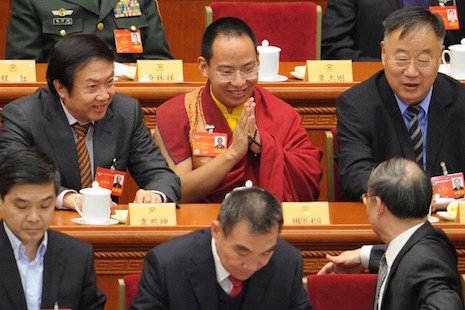Controls on religion inside Tibet have intensified

"It would also be difficult for any other authority or the police to seize them if they do not break the law," said Norbu.
Although his suggestions mark a stricter line on Buddhist doctrine, they also tie into Beijing's desire for greater overarching management of monks in Tibet. In trying to curb dissent against Chinese rule, Communist Party authorities have found roaming monks difficult to manage because they are often away from monasteries — the main institution used to control the monkhood.
The 11th Panchen Lama, Gyaltsen Norbu, center, a Tibetan Buddhist leader selected by Beijing but not recognized by the Dalai Lama, is pictured at a gathering in Beijing in March 2014. (Photo by Wang Zhao/AFP
In recent years, Beijing has insisted Tibetan monks follow Buddhist precepts. Statements by officials and experts in state media have warned the recent spate of Tibetan self-immolations in protest of Chinese rule – at least 140 since an uprising in 2008 – go against the Buddhist doctrine.
Alongside efforts to bind monks to their own precepts, authorities have introduced new rules and policies at monasteries, all of which are now manned by police.
"Controls on religion inside Tibet have intensified especially after 2008," said Tsering Tsomo, executive director of the Tibetan Center for Human Rights and Democracy in Dharamsala, north India. "Why are they doing this? There is a reason: these are efforts to secularize monks."
Norbu's remarks represent a return to the party line after a speech in March in which he warned that China's quotas on Tibetan monks and nuns – a rarely acknowledged open secret – meant "a danger of Buddhism existing in name only."
His comments were viewed by some observers as a jab at Beijing's Tibet policies. However, other analysts noted the Communist Party would have vetted his speech in advance.
Three months later, President Xi Jinping called a meeting in which Norbu said he would "not fail to live up to the ardent expectations of the party and people."
The Chinese government micromanages Norbu's public appearances and comments after predecessor Choekyi Gyaltsen became critical of party policy, prompting his imprisonment.
Following Choekyi's death in 1989, Beijing installed Norbu as the 11th Panchen Lama after detaining Gedhun Choekyi, the Dalai Lama's choice.
Since then, Beijing has typically used the World Buddhist Forum as a stage to expose Norbu to the wider Buddhist community, with varying degrees of success. At the First World Buddhist Forum in 2006, the then 16-year-old lama was reportedly shunned by visiting Buddhists despite Beijing making him figurehead of the inaugural event.
- Italian Catholic priest shot three times on his way to work in Bangladesh
- Missionaries weave back together shattered lives in Mindanao, Philippines
- Dutch priest murdered in his church in the besieged Syrian city of Homs
- What does it mean to be a missionary today?
- Jesuits mark 60 years in Nepal
- Letter from a Claretian Missionary working in Uganda.
- S SUDAN: Do not squander the chance for a better nation, says Agencies
- Missionaries weave back together shattered lives in Mindanao, Philippines
- Young People Should Speak of Christ without Fear


 Votes : 0
Votes : 0









